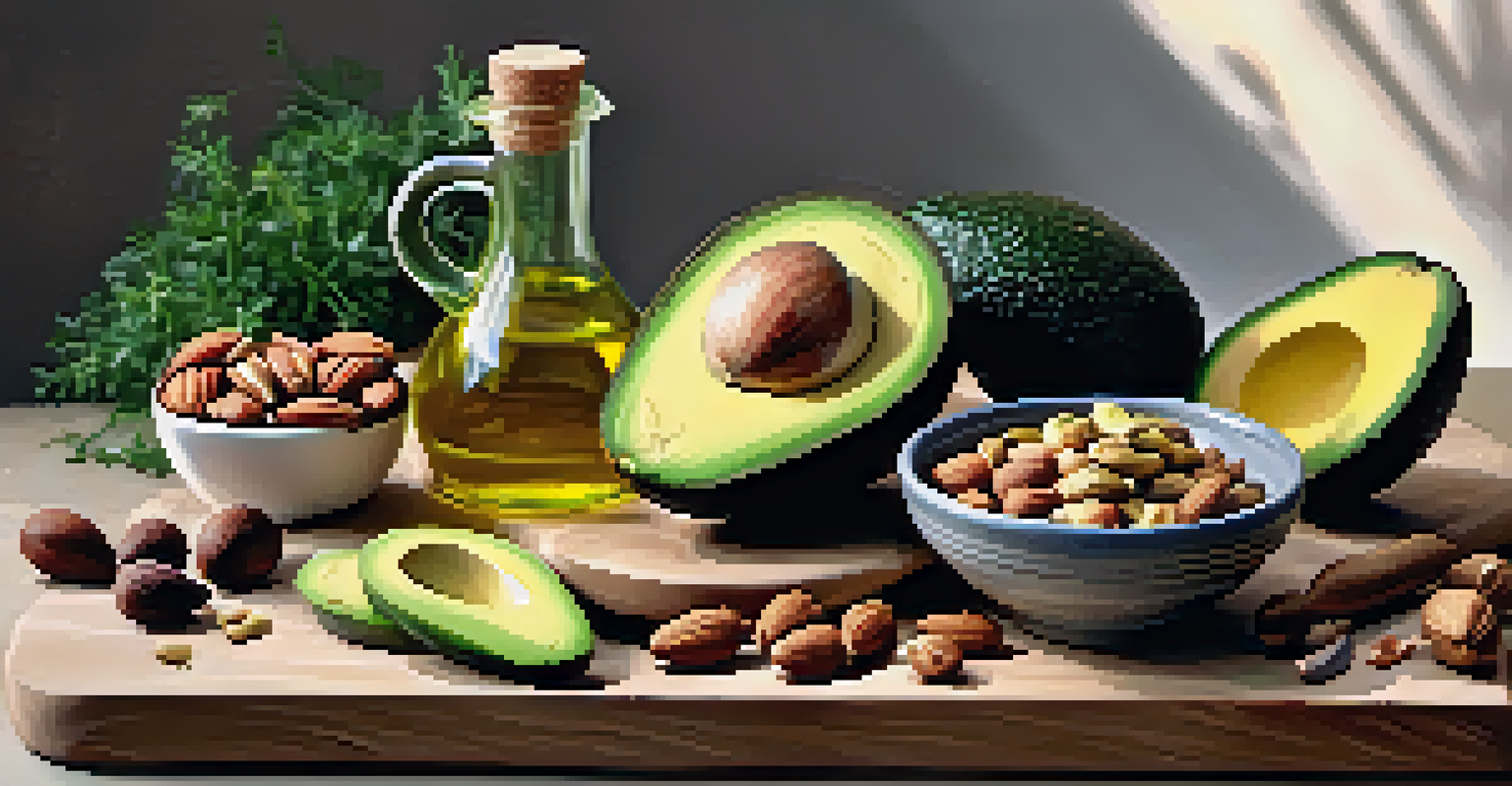Gut Health and the Impact of Dietary Fats

What is Gut Health and Why It Matters
Gut health refers to the balance of microorganisms living in our digestive tract, which is crucial for overall health. When our gut is healthy, it can effectively break down food, absorb nutrients, and support our immune system. Conversely, an unhealthy gut can lead to a range of issues, from digestive problems to more serious conditions.
The gut is the center of our health, and we need to nourish it with the right foods to maintain balance.
The gut is often referred to as our 'second brain' because it communicates with our central nervous system. This connection highlights how gut health can impact not just digestion but also mood and mental clarity. Understanding this relationship is key to appreciating why we should care for our gut.
In essence, maintaining a healthy gut is foundational for physical and mental well-being. It sets the stage for how well our body functions, making gut health a top priority in our dietary choices.
The Role of Dietary Fats in Gut Health
Dietary fats are an essential part of our nutrition, but not all fats are created equal. Healthy fats, such as those found in avocados, nuts, and olive oil, can nourish our gut microbiome. These fats help to feed beneficial gut bacteria, promoting a healthy balance within the digestive system.

On the flip side, trans fats and excessive saturated fats can negatively impact gut health. These unhealthy fats can lead to inflammation, which may harm the gut lining and disrupt the microbiome. Thus, the quality of fats we consume plays a critical role in determining our gut health.
Gut Health is Crucial for Well-Being
Maintaining a healthy gut supports digestion, nutrient absorption, and even mental clarity.
Incorporating the right types of fats into our diet can enhance our gut health, supporting digestion and nutrient absorption. This balance is vital, as it not only affects our gut but also contributes to our overall health and wellness.
How Omega-3 Fatty Acids Benefit the Gut
Omega-3 fatty acids, commonly found in fatty fish like salmon and flaxseeds, are known for their anti-inflammatory properties. These fats can help reduce inflammation in the gut, promoting a healthier digestive system. A diet rich in omega-3s can enhance the growth of beneficial bacteria, which is essential for gut health.
Eating healthy fats can help support a healthy gut and enhance the function of beneficial bacteria.
Incorporating omega-3s into your diet not only supports gut health but can also have a positive impact on mental health. Research suggests that a healthy gut microbiome can influence mood and cognitive function, making omega-3s a win-win for both gut and brain.
To reap these benefits, consider adding more sources of omega-3s to your meals. Whether it's a serving of fatty fish or a sprinkle of chia seeds on your yogurt, these small changes can make a significant difference in your gut health.
The Connection Between Fats and Gut Microbiome Diversity
A diverse microbiome is a hallmark of good gut health. Studies show that diets rich in healthy fats can promote this diversity, leading to a more resilient gut ecosystem. This diversity can help our gut adapt to various dietary changes and protect against harmful bacteria.
When we consume a variety of healthy fats, we not only support the growth of beneficial bacteria but also create an environment where harmful bacteria struggle to thrive. This balance is crucial for preventing gut-related diseases, such as irritable bowel syndrome or even more severe conditions.
Healthy Fats Boost Gut Microbiome
Incorporating healthy fats like those from avocados and nuts promotes the growth of beneficial gut bacteria.
To encourage a diverse microbiome, aim for an array of healthy fats in your diet. Incorporating different sources of fats, like nuts, seeds, and fatty fish, can bolster your gut's health and overall well-being.
Foods to Avoid for Optimal Gut Health
While healthy fats can be beneficial, certain types of fats can disrupt gut health. Highly processed foods that contain trans fats and excessive saturated fats can lead to inflammation, negatively impacting the gut lining. It's important to be mindful of what we consume to maintain a healthy gut.
Foods high in sugar and refined carbohydrates can also contribute to an unhealthy gut. These ingredients can promote the growth of harmful bacteria while stifling the beneficial ones, creating an imbalance that can lead to digestive issues. Steering clear of these foods can foster a healthier gut environment.
To protect your gut health, focus on whole, minimally processed foods. By avoiding unhealthy fats and incorporating more nutrient-dense options, you can create a balanced diet that supports your gut and overall health.
Probiotics and Fats: A Perfect Pair
Probiotics are live microorganisms that offer health benefits, particularly for gut health. When combined with healthy fats, they can work synergistically to enhance gut function and improve digestion. Foods like yogurt or kefir, when paired with a drizzle of olive oil or nuts, can create a nourishing meal for your gut.
Healthy fats can also help with the absorption of fat-soluble vitamins, which are essential for maintaining a balanced gut microbiome. Vitamins A, D, E, and K play critical roles in gut health, and consuming them with healthy fats can maximize their benefits.
Avoid Unhealthy Fats for Gut Health
Steering clear of trans fats and excessive sugars helps maintain a balanced gut microbiome and prevents digestive issues.
Incorporating both probiotics and healthy fats into your diet can lead to a powerful combination for gut health. Consider adding a probiotic-rich food alongside healthy fats in your meals for an extra gut boost.
Tips for Incorporating Healthy Fats into Your Diet
Incorporating healthy fats into your diet doesn't have to be complicated. Start by swapping out unhealthy fats for healthier options, like using olive oil instead of butter for cooking. This simple change can make a big difference in your overall fat intake and gut health.
Experimenting with different sources of healthy fats can also be fun. Try adding avocado to your salads, snacking on nuts, or blending chia seeds into your smoothies. These small additions can enhance your meals while providing essential nutrients for your gut.

Lastly, pay attention to portion sizes. While healthy fats are beneficial, they are also calorie-dense. Striking a balance is key to enjoying the benefits without overdoing it. With these tips, you can easily incorporate healthy fats into your daily routine for better gut health.